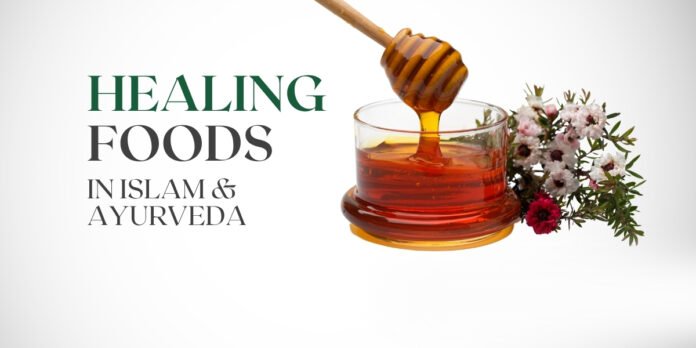In Pakistan, traditional medicine plays a vital role in health and wellness, with Unani medicine being the dominant system. Ayurveda—the ancient Indian science of health—has increasingly gained recognition for its holistic approach. Many foods recommended in Islam, such as honey, black seed, and dates, are also highly valued in Ayurveda for their therapeutic properties. This article explores the shared benefits of nine such foods and the connection between Islamic medicine and Ayurveda.
The Nine Prophetic Foods
Doshas & Humours
In Ayurveda, health relies on the balance of three energies or doshas:
• Vata (air and space): Movement and nerve function.
• Pitta (fire and water): Digestion and metabolism.
• Kapha (earth and water): Structure and stability.
Unani medicine, practised in Pakistan, is based on the balance of four bodily humours: blood (dam), phlegm (balgham), yellow bile (safra), and black bile (sawda). A balance of these elements is considered crucial to overall health.
1. Dates (Khajoor)
Prophetic guidance: Eating seven Ajwa dates each morning is recommended for protection.
Ayurvedic view: Dates balance Vata and Pitta, supporting energy and immunity.
Modern evidence: Dates are rich in antioxidants, fibre, and essential minerals, supporting heart health and reducing inflammation.
Preventive/Curative role: Boosts energy and strengthens the body’s resistance.
2. Honey (Asal)
Prophetic guidance: Honey is said to be a cure for every disease except death.
Ayurvedic view: Raw honey balances all doshas and has antimicrobial properties.
Note: Honey should not be heated in Ayurveda, as it becomes toxic when exposed to heat.
Modern evidence: Honey has proven antibacterial, antiviral, and anti-inflammatory properties, making it effective in treating wounds and soothing sore throats.
3. Olive and Olive Oil
Prophetic guidance: “Eat olive oil and anoint yourselves with it.”
Ayurvedic view: Olive oil is cooling and nourishing, reducing Pitta and balancing Vata.
Modern evidence
Preventive/Curative role: Supports cardiovascular health, joint mobility, and skin health. Olive oil, particularly extra virgin olive oil, is rich in heart-healthy fats and antioxidants, shown to lower cholesterol and reduce inflammation.
4. Black Seed (Nigella sativa)
Prophetic guidance: “Black seed is a cure for every disease except death.”
Ayurvedic view: Black seed reduces Kapha and Vata, benefiting digestion and respiratory health.
Modern evidence: Modern research confirms black seed’s potential in fighting infections, reducing inflammation, and boosting immune function through its active compound thymoquinone.
Preventive/Curative role: Strengthens immunity, aids digestion, and combats infections.
5. Barley (Sha’ir)
Prophetic guidance: Talbina (barley porridge) was recommended for grief and recovery.
Ayurvedic view: Barley promotes healthy metabolism and supports Pitta balance.
Modern evidence: Barley’s soluble fibre helps lower cholesterol and regulates blood sugar levels.
Preventive/Curative role: Soothes inflammation and aids digestion.
6. Vinegar (Khal)
Ayurvedic view: Vinegar is digestive and balances Kapha.
Modern evidence: Research suggests that vinegar, particularly apple cider vinegar, can improve digestion, regulate blood sugar, and support weight management.
Preventive/Curative role: Stimulates digestion, regulates blood sugar, and enhances metabolism.
7. Watermelon
Prophetic guidance: Watermelon is consumed with dates to balance heat.
Ayurvedic view: Watermelon hydrates and cools, balancing Pitta.
Modern evidence: Watermelon contains lycopene, which has been linked to heart health, and is an excellent source of hydration, supporting kidney function.
Preventive/Curative role: Aids hydration and relieves heat-related ailments.
8. Figs (Teen)
Prophetic guidance: Figs are a blessed fruit mentioned in the Qur’an.
Ayurvedic view: Figs balance Vata and Pitta.
Modern evidence: Figs are rich in dietary fibre, vitamins, and minerals, supporting digestion and helping to lower blood pressure.
Preventive/Curative role: Aids digestion and nourishes blood.
9. Milk
Prophetic guidance: “Nothing satisfies and suffices like milk.”
Ayurvedic view: Milk nourishes and pacifies both Vata and Pitta.
Modern evidence: Studies confirm that milk is an excellent source of calcium, vitamin D, and protein, essential for bone health and muscle function.
Preventive/Curative role: Supports immune function and tissue regeneration.

Shared Principles Across Healing Traditions
Islamic medicine, Ayurveda, and Unani medicine share principles of balance, using food as medicine, and recognising the mind-body-spirit connection. These traditions emphasise the importance of holistic health. The healing foods praised by Prophet Muhammad (PBUH) align with the principles of Ayurveda, transcending cultural boundaries. These foods offer a natural, preventative path to wellness rooted in balance and nourishment, providing simple yet effective ways to manage health in today’s world.
Preventive and Curative Nutrition
Both Islamic and Ayurvedic traditions regard food as medicine. The same foods are used preventively—to maintain balance and prevent illness—and curatively—to treat specific imbalances. For example, honey can be used daily to boost immunity (preventive), or mixed with black seed to treat a cold (curative).
The writer can be reached at aasiya@post.com







